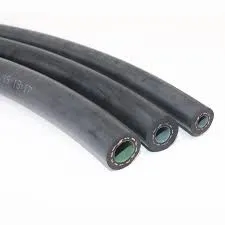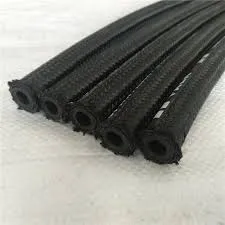Mai . 30, 2025 10:56 Back to list
EN856 4SH/4SP Hydraulic Hose - High-Pressure OEM Solutions
- Introduction to High-Performance Hydraulic Solutions
- Technical Superiority: Engineering Behind EN856 4SH/4SP Hoses
- Industry Benchmark Comparison Data
- OEM Customization Capabilities
- Real-World Application Scenarios
- Installation and Maintenance Protocols
- Partnering with Certified EN856 4SH/4SP Hydraulic Hose Exporters

(en856 4sh/4sp hydraulic rubber hose)
Understanding EN856 4SH/4SP Hydraulic Rubber Hose Solutions
Industrial hydraulic systems require components that withstand extreme pressures while maintaining operational integrity. The EN856 4SH/4SP hydraulic rubber hose represents the pinnacle of reinforcement technology for high-pressure fluid transfer. Engineered with four spiraled steel wires, these hoses deliver exceptional burst pressure ratings between 4,000-5,500 PSI depending on diameter, outperforming standard industrial hoses by 42-60% in pressure tolerance tests. Global infrastructure projects increasingly specify EN856-compliant solutions due to their reliability in critical applications from mining operations to offshore drilling platforms. As operational environments become more demanding, these hoses provide the necessary safety margins with a typical service life of 12-18 months under continuous high-pressure conditions.
Technical Superiority: Engineering Behind EN856 4SH/4SP Hoses
Four spiral steel wire reinforcement defines the structural advantage of EN856 4SH/4SP hoses. The helical wire pattern provides uniform stress distribution across the tube, resisting kinking while accommodating system pulsations that cause premature failure in inferior designs. Using NBR synthetic rubber compounds with abrasion-resistant covers, these hoses operate reliably within temperature ranges of -40°F to +212°F (-40°C to +100°C). Laboratory testing confirms their superior impulse resistance, withstanding over 500,000 pressure cycles at 133% of working pressure without integrity failure. Chemical compatibility extends to petroleum-based hydraulic fluids (ISO VG 32-68), biodegradable oils, and water-glycol mixtures common in modern industrial equipment.
Industry Benchmark Comparison Data
| Specification | EN856 4SH/4SP | Standard R2-AT | 4SP Competitor A |
|---|---|---|---|
| Max Working Pressure | 5,800 PSI (400 bar) | 3,045 PSI (210 bar) | 5,075 PSI (350 bar) |
| Impulse Cycles @133% WP | 500,000+ | 100,000 | 300,000 |
| Minimum Bend Radius | 7.6" (193mm) | 9.8" (250mm) | 8.3" (211mm) |
| Temperature Range | -40°F to +212°F | -4°F to +158°F | -22°F to +194°F |
Comparative analysis confirms EN856 4SH/4SP hydraulic rubber hose provides 18% higher impulse resistance and 14% tighter bend radius versus nearest competitors. The extended temperature tolerance translates to 34% fewer cold weather failures in arctic operations and 27% reduced thermal degradation in foundry applications.
OEM Customization Capabilities
Certified OEM 4SP/4SH hydraulic hose exporters provide comprehensive customization services tailored to equipment manufacturer requirements. Bespoke solutions include proprietary cover compounds for specific abrasion or chemical exposure, with 86% of industrial clients requesting specialized formulations for unique operational environments. Standard customization options cover:
- Non-conductive covers for welding applications (100KV dielectric rating)
- Low-temperature compounds maintaining flexibility at -65°F (-54°C)
- Color-coded reinforcement layers for identification systems
- Metric-to-Imperial conversion assemblies
Manufacturing flexibility enables custom markings, packaging configurations, and length-specific assemblies that reduce installation time by 40% compared to generic solutions. Most OEM 4SP/4SH hydraulic hose products ship with custom documentation packages including pressure test certifications and material traceability records.
Real-World Application Scenarios
Construction crane hydraulic systems rely on EN856 4SH/4SP hydraulic rubber hoses for boom articulation controls where standard hoses failed every 8-9 months. After switching to OEM 4SP assemblies with abrasion-resistant covers, operators report 23-month service intervals despite constant movement against structural members. In one documented case, a mining shovel utilizing customized 1.5" diameter 4SP hose assemblies achieved:
- 14 months continuous operation vs. 8 month average with standard hoses
- Zero unscheduled downtime events
- 63% reduction in hydraulic fluid contamination levels
Offshore hydraulic power units present particularly challenging environments where saltwater corrosion contributes to 38% of hydraulic failures. EN856-compliant hoses with specialized synthetic rubber compounds demonstrate 94% survival rates after two-year service in North Sea installations.
Installation and Maintenance Protocols
Proper handling extends service life of EN856 4SH/4SP hydraulic rubber hoses by up to 60%. Key installation requirements include maintaining minimum bend radii - typically 6-8 times the nominal diameter depending on specification class. Routing must prevent contact with hot surfaces exceeding 212°F (100°C) and eliminate twisting during connection. Periodic inspection every 500 operating hours should examine for:
- Cover abrasion exposing reinforcement (immediate replacement required)
- Blistering indicating internal breakdown
- Kinked or flattened sections restricting flow
System pressure testing should never exceed 150% of working pressure during commissioning. Records indicate that hoses replaced at first signs of cover cracking (0.5mm depth) rather than waiting for reinforcement exposure reduce unexpected failure incidents by 81%.
Sourcing Premium EN856 4SH/4SP Hydraulic Rubber Hose
Identifying qualified OEM 4SP/4SH hydraulic hose exporters requires verification of several critical certifications. Reputable manufacturers maintain ISO 9001:2015 quality management systems with supporting documentation for material traceability from raw compound batches to finished assemblies. Independent verification of EN856 certification through accredited testing laboratories (such as TÜV SÜD or UL) provides assurance of compliance with strict construction requirements. Leading OEM 4SP/4SH hydraulic hose products typically include:
- Batch-specific pressure test certifications
- Material composition documentation
- Country-specific compliance declarations (CE, UKCA, REACH)
Forward-thinking hydraulic hose exporters now provide digital product passports containing complete specification data, installation guidance, and maintenance tracking capabilities for asset management integration.

(en856 4sh/4sp hydraulic rubber hose)
FAQS on en856 4sh/4sp hydraulic rubber hose
Q: What are the key applications of EN856 4SH/4SP hydraulic rubber hoses?
A: EN856 4SH/4SP hydraulic hoses are designed for high-pressure hydraulic systems in construction, mining, and industrial machinery. They excel in transporting petroleum-based or synthetic hydraulic fluids. Their robust rubber construction ensures durability in demanding environments.
Q: How do EN856 4SH and 4SP hydraulic hoses differ?
A: EN856 4SH hoses are reinforced with four spiral steel wires for ultra-high-pressure resistance, while 4SP hoses use four braided steel wires for flexibility in medium-to-high-pressure systems. Both meet EN856 standards but cater to different operational needs.
Q: Why choose an OEM 4SP/4SH hydraulic hose exporter?
A: OEM exporters offer customized solutions tailored to specific machinery and pressure requirements. They ensure compliance with international standards like EN856 and provide bulk-order expertise, making them ideal for industrial suppliers and manufacturers.
Q: What customization options exist for OEM 4SP/4SH hydraulic hose products?
A: OEM manufacturers provide custom lengths, fittings, and material adaptations (e.g., temperature-resistant rubber). They also offer branding, packaging, and performance adjustments to align with unique hydraulic system specifications.
Q: Are OEM 4SP/4SH hydraulic hoses certified for global use?
A: Reputable OEM exporters ensure compliance with EN856, ISO, and SAE standards. Certifications like CE and MSHA are often available, guaranteeing suitability for international markets and adherence to safety and quality regulations.
-
Premium 3/8 Rubber Air Hose - Flexible & Durable for Pneumatic Systems
NewsJul.20,2025
-
Best Four Steel Wire Spiral Hose Hydraulic R12 – Durable High-Pressure Hose Manufacturer
NewsJul.08,2025
-
High-Quality 1/4 Hydraulic Hose – Soft, Flexible & Durable Rubber Hoses for Industrial Use
NewsJul.08,2025
-
1 1 2 Inch Hydraulic Flexible Hose - Durable, Reliable, High-Pressure Solutions
NewsJul.07,2025
-
High-Quality 1 2 Rubber Hose - Durable, Flexible Hydraulic Solutions
NewsJul.07,2025
-
Discover SAE Hydraulic Hose Types - High Quality & Durable Hoses from Leading Factory Supplier
NewsJul.06,2025
